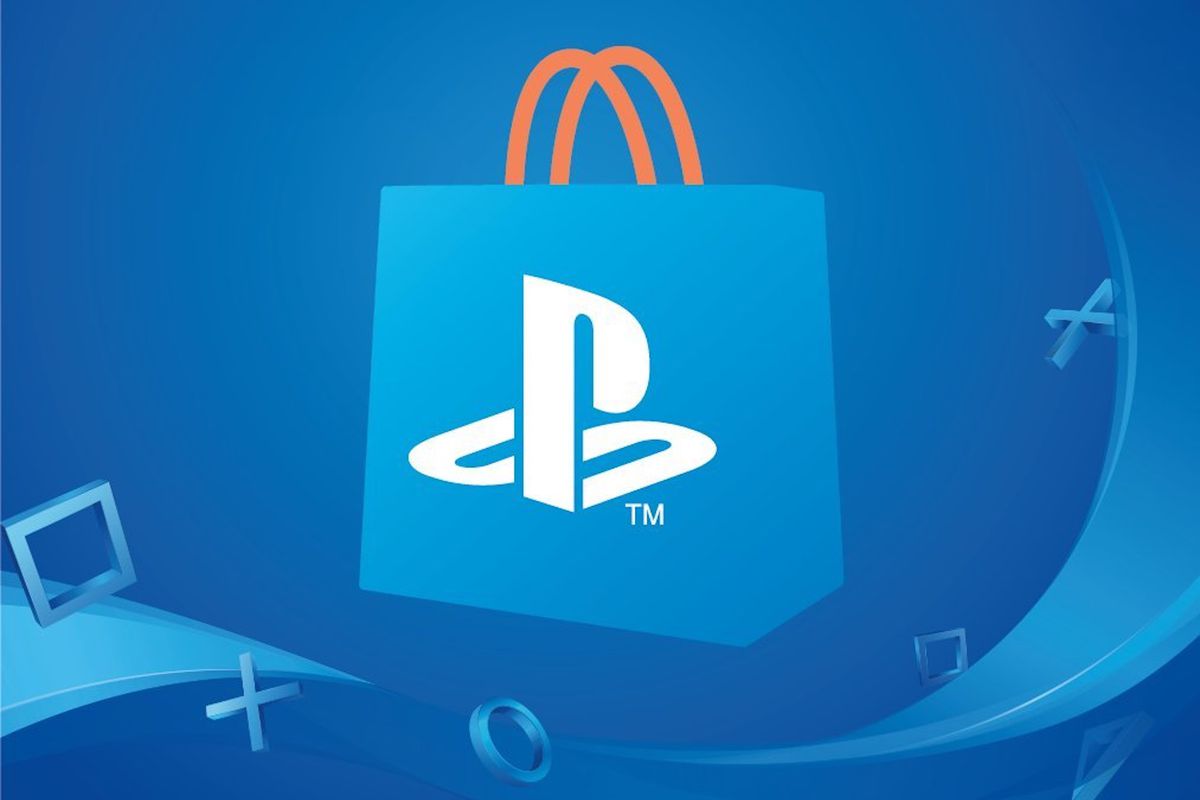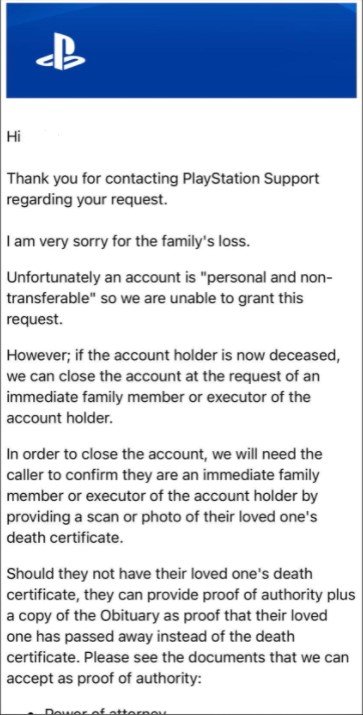Should ownership of digital game accounts be transferrable after death?

This is a topic that is a little morbid, but the conversation does come up every now and then and it is a conversation I’ve had with a friend before who couldn’t believe that you don’t actually own a digital item that you have purchased.
Instead, you purchase a license to use that item, such as a game or song. Unfortunately, when you pass away in theory your account goes with you and can/should not be able to be accessed by another person.
The reason for this article is I stumbled across a Facebook post where a person had passed away and the remaining relatives had wanted to gain ownership of their PlayStation account to continue playing the games that the person had purchased on their account, only to be met with Sony declining and wanting to close the account.
I have removed any personal details from the image that was shared online, but you can see Sony’s response below.

“Hi,
Thank you for contacting PlayStation Support regarding your request.
I am very sorry for the family’s loss.
Unfortunately an account is “personal and non-transferable” so we are unable to grant this request.
However; if the account holder is now deceased, we can close the account at the request of an immediate family member or executor of the account holder.
In order to close the account, we will need the caller to confirm they are an immediate family member or executor of the account holder by providing a scan or photo of their loved one’s death certificate.
Should they not have their loved one’s death certificate, they can provide proof of authority plus a copy of the Obituary as proof that their loved one has passed away instead of the death certificate. Please see the documents that we can accept as proof of authority.”
READ MORE: You can get GTA 5 for free from Rockstar Games this Christmas
The rest of the email is cut off in the screenshot, but you get the point of what the customer service staff member was saying.
Although the response may seem harsh and a bit stone-hearted, it is technically and legally correct, whether it is morally right or not.
When you spend £59.99 and buy the latest game you aren’t actually buying the game, instead, you are buying a license to grant you permission to play the game.
This means that one day a publisher could remove access to a game, which is why it is possible to get banned in games, or even an entire store platform such as Steam could decide to close and revoke access, and in theory, there is nothing you can do about it.
It is worth noting that this isn’t unique to just gaming, this also applies to any digital products such as an iTunes library.
However, it is extremely unlikely that we will ever see a situation where a store just removes access and you lose your entire library, but hypothetically they could.
Circling back to the topic at hand, when you purchase a game or digital product, you are buying a single license for you to play it via your account, not someone else.
This means that everything is tied to your account and that account is owned by you, which is where the issue lies.
In the event that an account holder sadly dies, legally the account goes with them, or at least legal access to the account.
This has led to the scenario that this PlayStation user has encountered, where a family member has passed away and his child is unable to access it and gain ownership of the account.
So, is it time that laws regarding digital products are changed and ownership of an account can be transferred? We think so.
It is worth noting that while a purchase of a digital item is typically a single-use license, it doesn’t mean that a company can’t use its own discretion and be able to grant ownership transfer.
When a lot of the laws and regulations were created, it was in the wild west days of the internet when everything was in its infancy.
But, the world has become a digital world now and is a completely different place when compared to the late 90s and early 2000s.
As most people now have accounts online for virtually everything, and especially as the entertainment industry moves away from physical media, this leaves many accounts in limbo in the unfortunate event that the owner passes away.
Like a physical item can be left to a loved one, it is about time that digital products are treated the same.
But, until the laws eventually change, our suggestion is to not share the unfortunate news with the digital platform, Sony in this instance, and instead simply change the password and/or email to the account and continue using it.
READ MORE: Halo Infinite Review (PC) – A perfect end to 2021
This will be simple to do if you have access to the original owner’s email address and/or phone so you can send a new password request and change it to something where you can access it.
It would also be worth people leaving login details to their digital accounts in their wills if they want to leave accounts to someone.
Hopefully one day the rules change and you can take over ownership, but for now you have to essentially pretend to be the original owner and just continue using it as normal.


